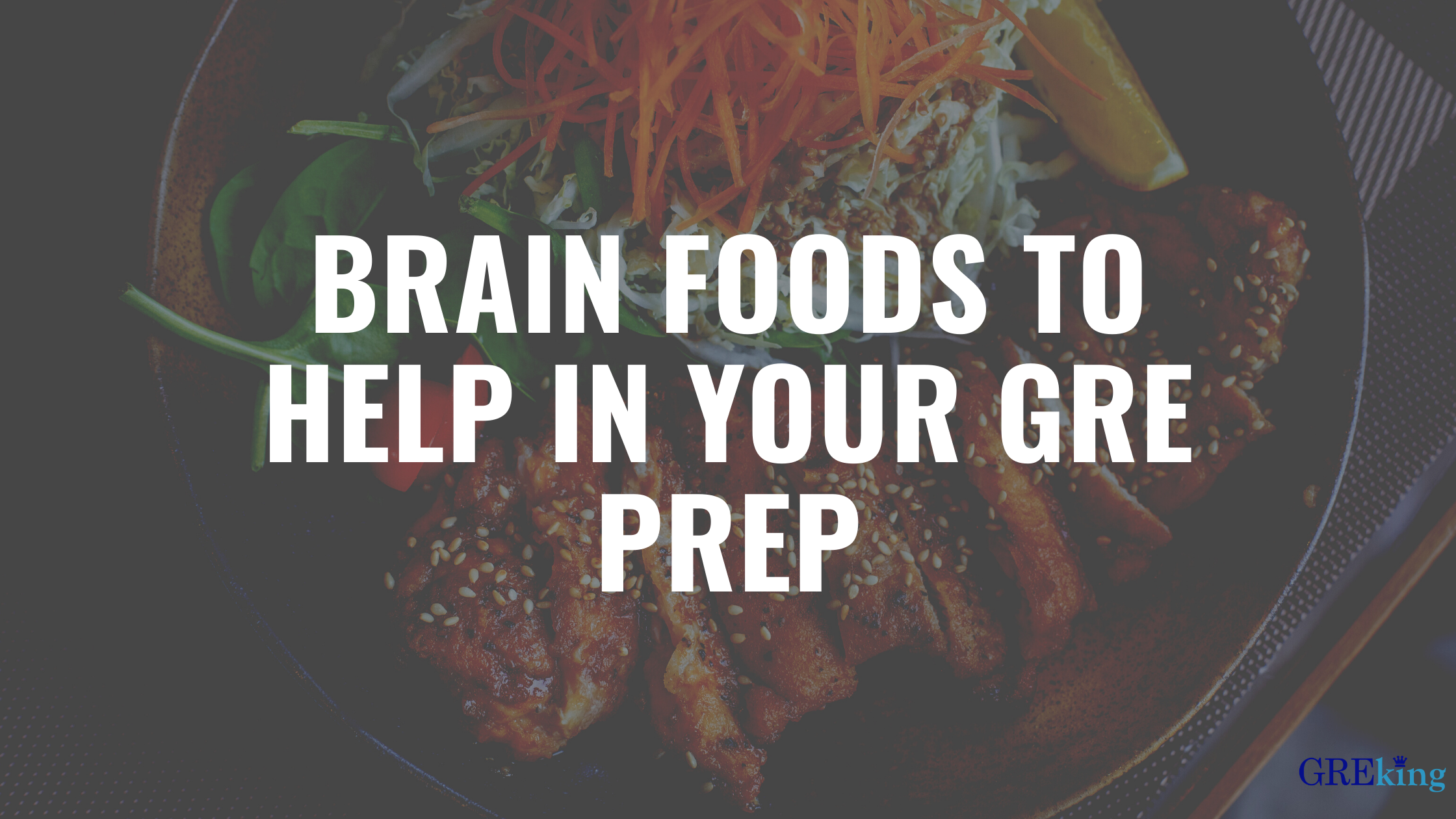Let’s talk about food: Brain foods for GRE Prep
How many times has it happened that you sat down to study and felt drowsy immediately? It is surely a common thing to feel bored or restless while preparing for your exams. Popular thought refers to your interest in the subject as the reason behind this. But actually, the main reason could be different. It has been found that our eating habits, and specifically what we eat influences our concentration and state of mind in a significant way. The GRE preparation time is crucial and good nutrition will go a long way in keeping up with your motivation and energy. This article talks about certain brain foods for boosting your energy levels during the GRE prep and also why you should focus on them and securing good GRE scores.

Rewind back to your school or college test days. If you are not one of those very exceptional students who do all the studying at the time, then the days before exams are your warzone. You must have resorted to drinking cups and cups of coffee, have kept Maggi packets stocked up in the fridge, ordered in lunch/ dinner just to save on precious time. But actually, you should do just the opposite of it.
Good foods, or brain foods as they are called should always be part of your study plan as they help you in becoming healthier and more focused thus in turn assisting you in performing better in tests.
Also Read: 7 GRE Study Habits of Highly-Effective Students
Improve your GRE scores and secure good GRE scores with GREKing
How does it help?
Consider your brain as a machine and the food you eat as fuel. The better the fuel, the better is your machine performance. Similarly, the more fulfilling your nutrition plan is and the more brain foods you include in your diet, the better will be your study performance.
It is said that while the brain accounts for only a very small percentage of our body weight, it does need a significant amount, around 20% of our daily calorie intake. For its proper functioning, the brain needs glucose and carbohydrate and these help in increasing retaining power, cognitive skills, sharpening focus.
Tips to follow
1. Follow the daily requirement chart
The first thing to start with is meeting your daily calorie requirements. Pay attention to what you are eating, not just the kind of foods but also the quantity of each food type. Meet your daily mineral, protein, vitamin needs. Measure the food accordingly. Irons and vitamins are considered extremely essential for maintaining energy and increasing attention.
2. Try to eat more and more natural foods
The world is a marketing canvas now. There are umpteen advertisements focusing on health supplements, vitamin capsules, dietary supplements for boosting your immunity, strength, daily vitamin requirements, and whatnot. We are not saying they are not helpful. However, nothing beats natural brain foods. For example, there are multiple Vitamin C tablets available in the market. However, you can also just eat lemon in warm water in the morning. It not only has vitamin C but also other antibiotic properties, which you will not get from a vitamin C tablet.
3. Multiple small meals over a single large meal
This is one of the most oft-repeated advice when it comes to brain foods and healthy eating habits. And rightly so. Research has proven that the popular habit of having three meals a day does more harm than good. It partly happens because when you eat just three meals a day you end up eating much more in a particular meal than is necessary. The ideal practice is to eat around 5-6 meals a day, keeping a gap of around 2 hours. This will help you in controlling the blood sugar, one of the main reasons behind feelings of tiredness and sluggish behavior.
4. Have a balanced diet
This one goes without saying. There are three main ingredients in a person’s diet. Protein, carbohydrates, and fats. For every person, there is a different requirement of calories depending on their BMI and the activities they undertake. Find out the daily calorie requirement for yourself and split according to these three nutrients. Popular notions suggest dividing proteins, carbohydrates, and fats in a 40-40-20 ratio, however this will also depend on your specific nutrients. It is best to connect with a nutritionist or a dietician to fix your diet plan.
5. Avoid Processed Food
This tip probably goes right against what you do during the exam preparation time. However, some of the best brain foods are fruits and vegetables which have a lot of natural sugars, vitamins, and proteins- very necessary to keep up your stamina while giving those tedious GRE mocks. Besides, there is a risk of having processed food, the refined sugar content in those might result in you feeling more sleepy than before! Eat more green, leafy vegetables. The darker the color of the vegetable, the more is its nutrient content.
6. Check your Glycemic Index(GI)
We know the name sounds complex, like a medical term! But GI is actually a tool that measures the time each food is taking for breaking down to its glucose components and ranks them accordingly. Glucose is what drives your energy level. However, too much glucose is bad for you, as the blood sugar level increases, you feel sleepy, lethargic and the amount of insulin in your blood also increases. Unfortunately for you, and us, most of our favorite foods, starting from pasta, cakes, ice cream, soft drinks, noodles have a very high level of GI. Nutritious foods like oatmeal, raw fruits, yogurt, brown rice etc. are low on GI content and are considered as low-carbs which leads to higher energy.
7. Drink lots of water
Staying hydrated helps you remove your body from toxins, keeps your cells and tissues healthy, and makes you feel energetic. This is especially required during your exam preparation as dehydration leads to a lot of problems including but not limited to feelings of nauseousness, lethargy, and scattered attention. But in the bid to stay hydrated, don’t start consuming any beverage. Soft drinks have lots of refined sugar, thus causing problems of increasing sugar levels in your blood. Again, coffee, though excellent for those long nights makes you dehydrated and edgy. Green tea is an excellent option in terms of beverages. It boosts your immunity, burns fat, and has a lot of anti-oxidants.
Some of the popular brain foods to secure good GRE scores are:
- Leafy Greens
- Whole Grains
- Brown Rice
- Green Tea
- Low Fat
- Milk
- Egg Whites
- Fish
- Nuts
- Fruits
- Chicken
- Water
- Vegetables
- Whole Grain Bread
- Oatmeal
- Multigrain Biscuits
- Yogurt
- Snickers
- Pumpkin Seeds
- Coconut
- Peanut Butter

You can have coffee but not more than 2 cups a day. Similarly, you can have chocolates, but choose dark chocolate over milk chocolates.
Try to avoid fast and junk foods, white rice, foods cooked in refined oils, sweets, cakes, cold drinks, pastries, cookies, chips, cornflakes, sugar, potatoes, etc. Basically, foods that have a lot of starch and easily broken down carbohydrates.
Keep in mind eating good food is not the only thing you need to do to stay healthy while preparing for your exam. Sleeping well and exercising regularly is also equally healthy. However, focusing on eating habits is important because it influences the other two activities also. If you do not eat enough proteins, you will get tired very easily after a workout and won’t have the energy to study. Again, if you drink too many cups of coffee, you will not be able to sleep well.
We know the list omits many of your favorite foods. Trust us, they are also our favorites. But look at it as a long term achievement. These will help you stay healthy and ace good GRE scores in exams. Who knows, you might as well develop a long-lasting sustainable, and healthy food habit.
















Leave a Reply
You must be logged in to post a comment.